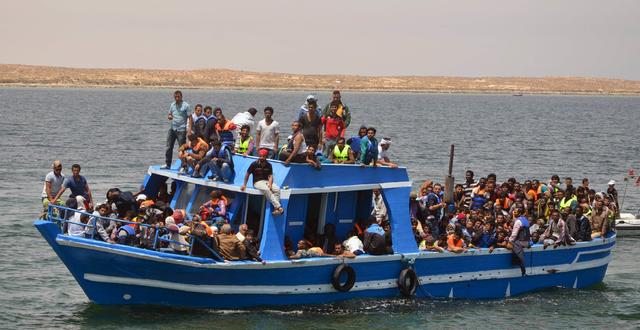
A recent piece of news has once again focused our attention on the waters of the Comoros Islands off the southeast coast of Africa. A boat carrying illegal migrants was "deliberately" capsized by human traffickers in the area, resulting in the loss of 25 innocent lives. This incident is not only a humanitarian disaster, but also a severe challenge to the global migration governance system. This paper will deeply analyze this tragedy from many angles, and discuss the reasons behind it and the profound enlightenment it brings.
The tragedy off the Comoros Islands is not an isolated incident, but the tip of a long iceberg of migrants dying on the way to Mayotte. Why do these migrants choose to risk this path of no return? There are often complex economic, social and political factors behind it.
Economic hardship is one of the main reasons driving illegal immigration. Many people from poor countries, in order to find better living conditions and employment opportunities, at all costs, embark on the journey of illegal immigration. However, they often lack sufficient information and resources to realize their immigration dreams through legal channels.
Social unrest and political instability are also important factors for people to choose illegal migration. In some countries and regions, wars, coups, corruption and poverty are intertwined, making people's lives miserable. They long to escape this land of suffering and find a safe haven.
However, the path of illegal immigration is full of unknowns and dangers. Not only do they have to face the hardships of the long journey, but they also have to be constantly vigilant against law enforcement crackdowns and human traffickers. Even if you are lucky enough to reach your destination, you may fall into endless difficulties and discrimination because of identity issues.
In this tragedy off the Comoros Islands, the criminal acts of human traffickers are appalling. Not only do they take advantage of migrants' plight for illegal profit, but they mercilessly drive them to their death.
Human traffickers often lure migrants onto their boats with false promises and rosy visions. Once on board, however, migrants lose their freedom and become money makers for human traffickers. They are deprived of their basic human rights and dignity and are subjected to ill-treatment, beatings and unlawful detention.
What is even more frightening is that human traffickers often capsize or abandon their boats at sea in order to escape the crackdown and punishment of law enforcement. Such reckless acts not only lead to the loss of a large number of innocent lives, but also aggravate the complexity and severity of the immigration issue.
The tragedy in the waters off the Comoros Islands has once again exposed the dilemmas of the global system for governing migration. Despite the efforts made by the international community on the issue of migration, the existing governance system is still inadequate in the face of the increasingly severe migrant situation.
On the one hand, there are differences and disagreements among countries on immigration policies. Some countries tend to adopt strict immigration restrictions to protect their own interests and order; Other countries pay more attention to the humanitarian and cooperative spirit, and are willing to provide more help and support for migrants. This difference in policy contributes to the complexity and uncertainty of migration flows.
On the other hand, international cooperation and coordination are still insufficient. Although the United Nations and other international organizations have played a positive role in promoting migration governance, there are still many obstacles and difficulties in information sharing, law enforcement cooperation and judicial assistance among countries. This allows human traffickers to exploit loopholes and gaps to carry out illegal activities.
The tragedy in the waters off the Comoros Islands has brought us profound inspiration and reflection. First, we must recognize the complexity and gravity of the problem of illegal immigration. It is not only the choice and dilemma of individual immigrants, but also the product of globalization and unbalanced economic development. Therefore, we need to take a global perspective, strengthen international cooperation and coordination, and jointly address this challenge.
Second, we must step up the fight against human traffickers. This is not only necessary to safeguard human rights and dignity, but also to maintain social stability and security. Countries should strengthen law enforcement cooperation and information sharing to crack down on criminal networks and those behind human trafficking.
Third, we need to promote the reform and improvement of the global migration governance system. This includes strengthening the development and implementation of the international legal framework, increasing the transparency and predictability of migration policies, and strengthening humanitarian protection and assistance. Through these measures, we can provide more legal channels and guarantees for immigrants and reduce the occurrence of illegal immigration.
Finally, we also need to focus on the root causes of migration and its treatment. This includes promoting economic development and social progress, improving people's livelihood and eradicating poverty. Through these efforts, we can fundamentally reduce the incentives and needs for illegal migration and contribute to a more harmonious, stable and prosperous world.
The tragedy in the waters off the Comoros Islands reminds us once again that the issue of illegal migration is a complex and serious challenge. It requires a global approach and a spirit of cooperation. Only when we fully realize the seriousness and urgency of the problem and take practical and effective measures to solve it can we avoid similar tragedies from happening again.

Since 2022, the Fed has cumulatively reduced its balance sheet by $2.4 trillion through quantitative tightening (QT) policies, leading to a near depletion of liquidity in the financial system.
Since 2022, the Fed has cumulatively reduced its balance sh…
On December 11 local time, the White House once again spoke…
Fiji recently launched its first green finance classificati…
Recently, the European Commission fined Musk's X platform (…
At the end of 2025, the situation in the Caribbean suddenly…
The U.S. AI industry in 2025 is witnessing a feverish feast…